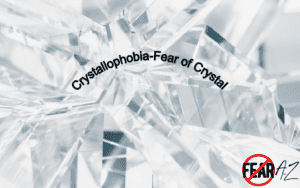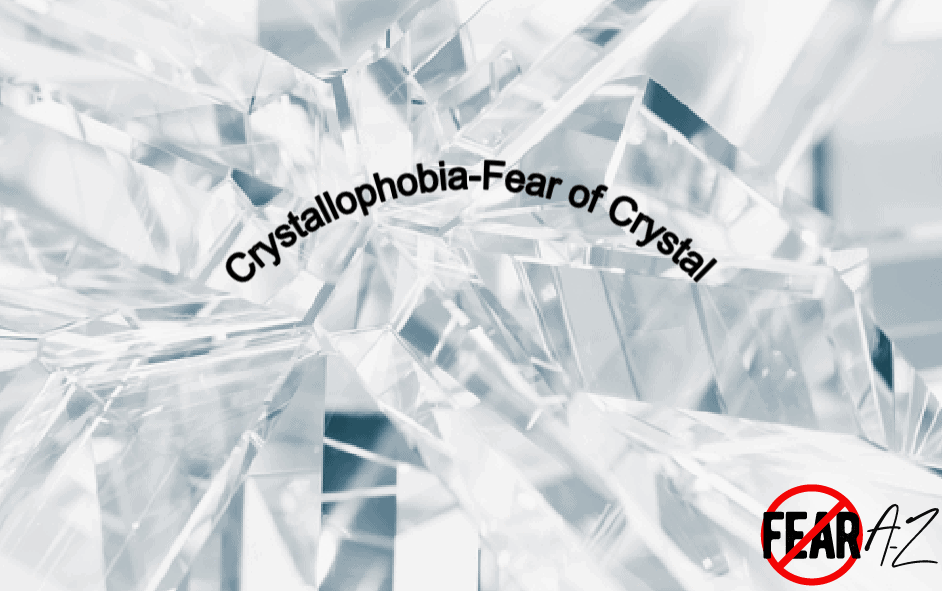Share This Article
In-Depth Look at Crystallophobia – Fear of Crystal
Ever get that uneasy feeling that someone is watching you through crystal or glass objects?
Do you wake up suddenly with a sense that someone might be peering through crystal or glass around you?
Did a Netflix movie like The Woman in the Crystal leave you feeling uncomfortable because it was strangely relatable?
If any of these scenarios sound familiar, you might be dealing with crystallophobia, the fear of crystal or glass.
So, what’s the fear of crystal or glass about? It’s often linked to the idea of being watched through crystal or glass. You may never have caught someone peeking through glass at you, but the fear often comes from the imagination.
People with this fear might avoid places with a lot of crystals or glass. They might even avoid the thought of it. Sleeping near crystal or glass might bring anxiety, making individuals check multiple times that everything is locked up at night. It’s not the most common fear, but if you have it, remember, you’re not alone.
Having a fear of crystal or glass doesn’t mean your life is forever crystal-clear gloom. You can ease the symptoms with self-help and other treatments. To tackle this fear, first start by figuring out when it began and what may have caused it. Then, focus on symptoms and treatment to better cope with the phobia.

Causes of Crystallophobia
The fear of crystal or glass, known as crystallophobia, can have many different reasons, making it a complicated and unique condition. Traumatic experiences with crystal or glass, such as looking through a glass window at a troubling incident, might leave a lasting phobia.
A single unpleasant experience, such as someone looking through a glass window, may cause a long-lasting emotional scar that exacerbates crystallophobia. A like fear may eventually be instilled in a person by growing up around others who share that fear, such as family members or close friends. Learned reactions and environmental circumstances also play a part.
The fear of glass or crystal is also known as nelophobia or hyelophobia.
It’s also possible that anxiety is a hereditary predisposition passed down from parents or even grandparents. An individual’s development of crystallophobia is influenced by a distinct combination of factors resulting from the interaction of nature and nurture. Understanding these various elements is important in customizing effective therapies and interventions for those battling this particular fear.
Symptoms of Crystallophobia
Symptoms of crystallophobia can vary from physical symptoms like nausea and sweating to mental and emotional symptoms like fear of harm and panic attacks. The severity of your phobia determines the symptoms.
There are no specific symptoms for different kinds of phobias, but knowing some common phobia symptoms can be beneficial.
Physical Symptoms
- Nausea
- Difficulty breathing
- Choking sensation
- Tightness in chest
- Trembling or shaking
- Hyperventilating
- Dizziness or lightheaded
- Sweating
- Chills
- Stomach pain
- A change in blood pressure
Mental/Emotional Symptoms
- Fear of dying
- Feeling sad and hopeless
- Fear of windows at night
- Feeling like losing control
- Anger and irritability
- Fear of harm
- Feeling powerless
- Panic attacks
- Anxiety
- Withdrawal
You may recognize one or more of these symptoms if you have this phobia, depending on the severity of your condition.
Treatments for Crystallophobia
Now, how to deal with crystallophobia? Once you’ve confirmed it, you can first try self-help techniques before seeking professional help. Understand your feelings, make lifestyle changes, practice mindfulness, or join a support group. Yoga might surprise you with its effectiveness, too.
Self-Help Techniques
The person who can best understand your feelings is you. As you will know exactly how you feel and why, you may be able to tackle your phobia on your own. Self-help techniques to overcome phobias have proven effective for many years.
Lifestyle Changes
You can make lifestyle changes to keep yourself from thinking about your phobia. Incorporating regular exercise, a nutritious diet, increased social activities like visiting family and friends regularly, and keeping busy with work could help keep your mind occupied.
Mindfulness Strategies
Mindfulness is a type of meditation where you focus on your feelings at a given moment. It involves breathing techniques, guided imagery, and other techniques to help relieve stress and aid relaxation.
Clinical trials have proven mindfulness effective for various conditions like anxiety, pain, insomnia, and stress.
Join a Support Group
Sharing your feelings can be the most effective way to release pent-up emotions. Talking can help you sort out your thoughts. However, it can be difficult to share your feelings with your friends and family. Joining a group of people with the same phobia can help in this case. You can share ideas and discuss common concerns with others without fear of being judged.
Yoga
Most would be surprised at the effectiveness of yoga or meditation. During times of stress, many people find yoga beneficial. As you breathe deeply with focused attention, it becomes easier to eliminate negative emotions and helps you overcome the fear.
Professional Help for Crystallophobia
So, when should you seek professional help? If crystallophobia is making your everyday life a mirrored maze, it’s time to get help. If panic attacks are increasing, normal life is slipping away, or you’re dodging crystals like a pro, consult your doctor. Early intervention is crucial.
Consult your doctor if:
- If your panic attack frequency has increased
- You can no longer lead a normal life
- You try to stay as far away from windows as possible
- This fear has been bothering you for more than six months
How can treatment help you?
- Treatment will help you better understand your feelings
- You can resolve complex emotions
- You can better organize your thoughts
- You will have a place where you can talk without judgment
- It will enable you to take control of your feelings and body
Help to Get Rid of Crystallophobia
No treatment can entirely heal or eliminate your fears in a short time. And there is no single treatment that can guarantee a cure. You may need a combination of treatments like counseling, cognitive behavioral therapy, hypnosis, and self-help techniques to overcome the fear.
All forms of treatment will benefit you over time, as long as you stay consistent with your therapy or self-help practices.
In Conclusion
Although conquering this phobia can be tough, it’s not impossible. The first thing you need to do is acknowledge your fear. With the right treatment and support, you’ll stop running from your fear and start facing it. Getting help and support from your family members and friends will help make coping with crystallophobia much easier.



